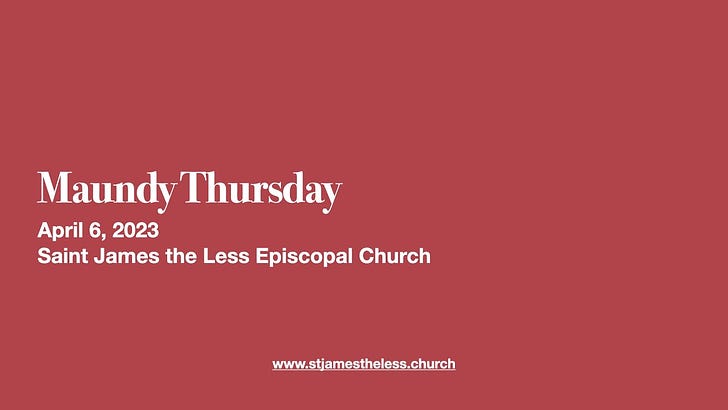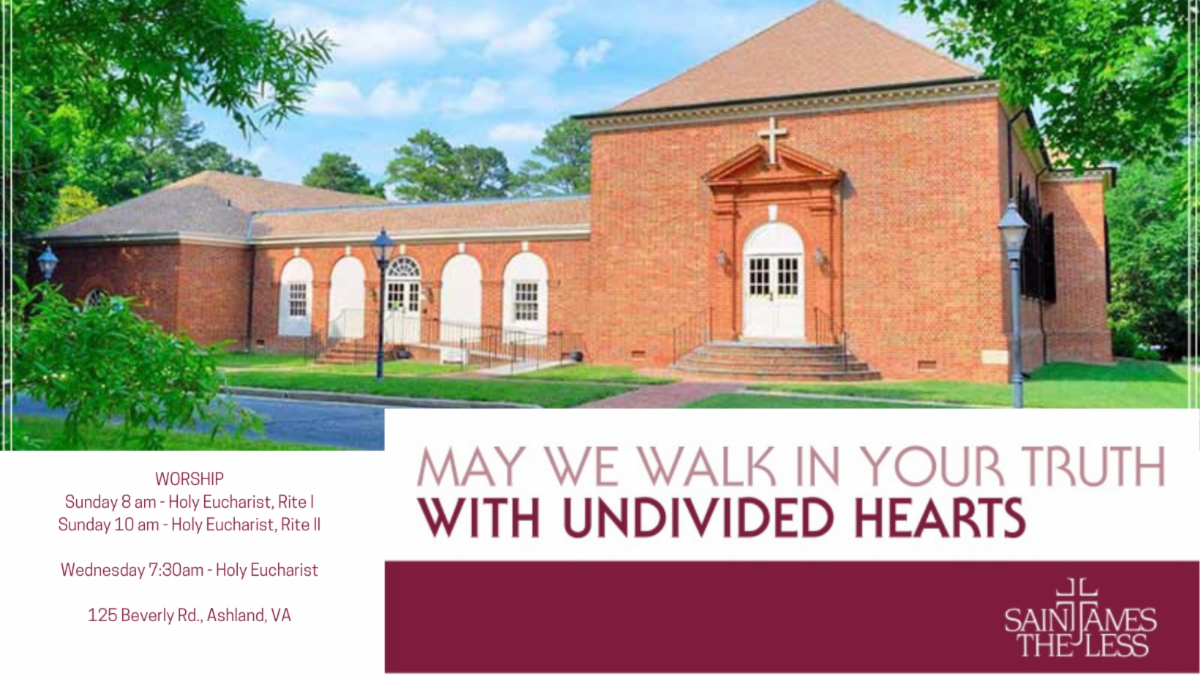Mandatum, y’all.
I’m preaching at Saint James the Less Episcopal Church in Ashland, VA this evening at 7pm for the Maundy Thursday service. The following is the current draft of the sermon text. Like some of my mentors (see: Akma Adam), I may even edit as I sit up on the dais. But this is what I got right now. I cannot recall a time I preached about the Eucharist so matter of factly. But this is the night for such a sermon. Y’all have fun.
I give you a new commandment, that you love one another. Just as I have loved you, you also should love one another. By this everyone will know that you are my disciples, if you have love for one another.
The Lord be with you.
Let us pray.
Lord, I believe. Help my unbelief. Make these words more than words and give us all the Spirit of Jesus. Amen.
Please be seated.
There are no prerequisites to being loved by God.
There are no prerequisites to being loved by God.
You don’t have to be a certain height or age. You don’t have to be a particular gender or profession. You don’t have to be black, white, or brown. Rich. Poor. Sober. Drunk. Gay or straight or other, God is going to love you. There is, as Paul said, absolutely nothing that can separate you from the love of God.
God’s love is persistent.
God’s love is all encompassing.
God’s love is final.
***
In John’s Gospel, Jesus knows what is to come. He knows how it’s all going to fall apart. He knows what his end will be. So, here, at the end of everything, Jesus offers up a commandment. Love. Love one another.
As I have loved you…Love one another.
Good evening. My name is Tripp Hudgins and, as advertised, Rock and I have known one another since the before times in college. I am, like Rock, a baptist minister who has made the move into the Episcopal Church. There is a sense of homecoming to it. I was baptized here in 1970. Sometimes our faith journeys take us back to our beginnings.
Thank you to all who have welcomed me and my family so warmly as we have gotten settled back in the area. This is a gracious and warm community and I am grateful to be here with you. I even went so far as to get a name tag made.
There is something so simple about this evening’s scripture and yet, this commandment to love one another opens up a Pandora’s box of implications and challenges.
When Christ commands us to love one another, he is telling us not to limit the love we offer the world. He’s telling us that even Judas who will betray him is loved. He’s telling us that even Peter who will deny him is loved. All those who would later desert him are loved. This is how we are called to love as well. Completely. Even in the face of desertion, denial, and betrayal: love.
This is his final word to his disciples before his tribulation begins.
This does not mean one should remain in an abusive or cruel situation. Let me be clear about that. If you are suffering abuse at the hands of another, please come to us for help. Sometimes, the most loving thing you can do…for yourself and others…is escape.
Jesus loves us so that we might know how best to love one another.
Liberation
Redemption.
Salvation.
This is what Christlike love can look like if we are willing to participate in it.
And this commandment closes a loop of sorts. Matthew, Mark, and Luke tell this story.
34When the Pharisees heard that he had silenced the Sadducees, they gathered together, 35and one of them, a lawyer, asked him a question to test him. 36“Teacher, which commandment in the law is the greatest?” 37He said to him, “‘You shall love the Lord your God with all your heart, and with all your soul, and with all your mind.’ 38This is the greatest and first commandment. 39And a second is like it: ‘You shall love your neighbor as yourself.’ 40On these two commandments hang all the law and the prophets.”
In John, Jesus adds a new commandment that defines the two he held up as the Greatest Commandment earlier in his ministry. If you wish to know what it looks like to love God and to love neighbor, look to the life of Jesus.
Lately, it seems that America is a strange place for such a love as this. We surely need it, but it can seem far away and foreign. So much of our public discourse is filled with rancor and division. Day after day, news cycle after news cycle, we baptize our politics with religious fervor. And in the process, we fail to love.
We are asked daily to be unloving.
We are asked daily to be ungodly.
Even within the church, the dividing lines are drawn and we cast one another out. What will it take to love one another? What does love look like? This is the question we need to answer for ourselves individually and collectively.
If we are going to “walk in truth with undivided hearts,” we will need the love of Christ to sustain us.
What Jesus offers us tonight is a means to find such sustenance. Jesus gives us a way to receive him that crosses time and space.
We can find that sustenance in the Supper of the Lord, the Eucharist.
The Eucharist is a participation in God’s love that empowers us to love as Christ loved…
The love of God in Christ Jesus is Eucharistic in form.
Take.
Bless.
Break.
Give.
The elements (bread, wine, and the gathered faithful) are taken, blessed, broken, and given. We are taken, blessed, broken, and given to the world. We are “sanctified” as the language goes. We become the sacrament, the Body of Christ, through the Eucharist.
The Eucharist is a memorial in that it helps us remember what it is to Love as Christ loves and that we are called to love the world in the way that Jesus loves the world. The Eucharist is a sacrament in that it is an effective means to receive God’s love.
If you wish to receive God’s love,
come to the table.
If you wish to love as Christ loved,
come to the table.
If you love one another,
come to the table.
This is the power of Jesus instituting the meal, on his last night with his disciples.
As Diana Butler Bass states, it was not a somber meal. That is our imposition. It would have been a party. They gathered for the Passover not a wake. Only later would they understand it as a last meal. Only later would we call it The Last Supper. What if, Bass asks, we were to see it instead as the first meal of a new history, a revolution of love and companionship? She writes:
“[T]he First Feast of the Kingdom That Has Come. The first meal of the new age, the world of mutual service, reciprocity, equality, abundance, generosity, and unending thanksgiving. Pass the cup, keep it going, hand to hand, filled and refilled, time after time. This night is the final night of dominion, the end of slavery; and this night is the first night of communion, the beginning of true freedom: “I will no longer call you servants but friends.”
Friends of God, God does not give up on us. We are not to give up on one another.
There are no prerequisites to being loved by God.
You don’t have to be a certain height or age. You don’t have to be a particular gender or profession. You don’t have to be black, white, or brown. Rich. Poor. Sober. Drunk. Gay or straight or other, God is going to love you. There is, as Paul said, absolutely nothing that can separate you from the love of God.
Come to the table.
Maundy Thursday, 7 pm: We have our remembrance of the Last Supper with the Apostles, followed by the stripping and cleansing of the altar. We will have a new addition with Tripp Hudgins as our guest preacher. Tripp is an old friend from the University of Richmond, who has been attending SJtL. He was actually baptized here in the 70s, so he is actually coming home. He taught preaching at the Church Divinity School of the Pacific while working on his doctorate, and he leads our musicians during our Bluegrass Mass. I know you will get much from his good word on Maundy Thursday.




